FutureSheLeaders (3)
Royesh: Faiza jan, hello. Welcome to this special episode of “Tomorrow’s Leaders.”
As a girl who is about to turn 18, this year, you are also stepping into the legal age of civic responsibility in the global context we live in.
What do you think about turning 18, especially in light of a term like “empowerment,” what kinds of fears does it bring for you, which you would recognize as a “fear zone”?
And what limiting beliefs do you feel you are facing—beliefs that you now feel you are overcoming?
Faiza: Faiza Haqjoo: In the name of God. Greetings to you, respected teacher.
I’m happy to see you cheerful and in good health. I am Faiza Haqjoo, 18 years old, from Malistan district of Ghazni province.
As you said, turning 18 gives a person a certain feeling—the feeling that you are no longer a child, and that we are going to face greater responsibilities, as well as more difficulties and challenges.
This in itself is a fear zone, but at the same time, it is something very beautiful, because day by day you grow up, and you’re meant to have a new life and a new perspective.
Royesh: In 2023, in the month of June—exactly around this time—when we started Cluster Education in Quetta, you were among the very first students who joined the program.
And actually, the first empowerment classes were also held with your group, in the Esteqlal Cluster.
At that time, what kind of new experience was empowerment for you?
As a girl who had come from Afghanistan, now living in a refugee setting, still holding the memory of the fall of Kabul, and the memory of all the pressure and restrictions placed on girls in Afghanistan, what new message did empowerment give you?
Faiza: For me personally, empowerment was a starting point—the beginning of a new life, a new perspective on life.
When we become refugees, we face many problems, we face many challenges. And when Cluster started and the empowerment classes began, those days were very exciting for me and made me feel more motivated and enthusiastic.
Because it was a space where we could get to know ourselves and believe in who we are, and get to know our dreams. And since migration came with its own difficulties, after we became refugees, it brought deep depression upon me and I truly had no clear dream anymore.
I would often think: now that we’re not going to school, and even if we finish school, there still won’t be a path forward for us to continue life. On one side there was homelessness, on the other side, there were financial, emotional, and mental difficulties.
All of them had put a lot of pressure on us all at once. The empowerment classes were truly like medicine for an illness that had long needed it.
And empowerment also had many effects on me. It helped transform the old Faiza into the Faiza I am now. And I’m truly very happy about that.
Royesh: One of the main things we focused on during empowerment lessons and exercises was to face despair, depression, and hopelessness.
And the goal was to truly understand ourselves at least once, to feel that we have inner abilities, and that we can overcome our fears and challenges more easily than we think.
For you, as a girl who was about 15 years old at that time, what was this empowerment or discovery of your own abilities? For example, what was something you noticed in yourself for the first time that made you feel there was no need to be afraid anymore, no need to feel hopeless?
In this regard, empowerment— what was the new gift it brought, or the new window it opened for you?
Faiza: What empowerment made me realize was that I began to believe in myself— that even one person can be the voice of thousands of others, and one person can change the world.
Also, in the SA group where we sang the song “Don’t scare Us Anymore,” that was truly a voice we might not have been able to express in words, but through music, through art, we expressed it.
Royesh: What do you think? Who was your audience? Who were you addressing when you said “don’t scare us,” and what was it you felt was scaring you that you were expressing through that song?
Faiza: When we said “don’t scare us anymore,” our target wasn’t directly the Taliban, etc. It was all about confronting all the beliefs, all the judgmental views toward girls, and all the problems—everything.
We were addressing all of them, saying “don’t scare us anymore.” It meant that we are stronger than before, and we are not afraid of anything.
Royesh: Did you feel that in your group, when they said “don’t scare us anymore,” they believed in their own power, or were they just trying to convince themselves, feeling like “we have to say this,” was it just a slogan, a slogan of resistance?
Faiza: No, it was never like that. Because this song was like a revolutionary anthem and honestly, while practicing the song, we ourselves felt that we were raising the voice of a generation.
And when we said “don’t scare us anymore,” we felt even stronger.
And those who were with us in the song— we had all become like a team that stood against problems, oppression, and injustice, and we sang that anthem together.
Royesh: You’re also a member of the football team. As a sport, what new feeling does football give you? As a girl, when you first entered a football field, what did it feel like you were doing? Did it feel like something new that connected to your sense of empowerment?
Faiza: In general, for women in our society, sports are like breaking a taboo. Especially football, since most people believe that football is a game for boys and men.
But when we entered football and sports, for me, football and the field were not just a game. When I step onto the field and run, I feel like I leave behind all my pain and suffering right there, move forward, and feel lighter and more powerful.
When we are in empowerment, we always become stronger emotionally, and we also need to become physically strong. That’s why when we play football, our confidence increases and it helps us feel stronger and freer.
Royesh: They say that football—as we used to tell you in the empowerment sessions— is a game that contains many empowerment exercises within it. For example, from the moment you form a team, enter the field, consider your playing zone, plan your tactics, pass the ball to each other, and aim for the goal— each of these represents part of the concepts and terms of empowerment.
Can you explain how, for you, stepping onto the football field reminds you of your empowerment lessons?
Faiza: In empowerment, we learn that people generally prefer to stay in their safe zone and don’t want to take risks or face challenges.
When we go onto the football field, it means we are stepping out of our safe zone and we’re no longer worried if, say, the ball hits our face, or if we fall down… We leave our safe zone and enter our fear zone. A place where we might get kicked in the leg, we might get badly injured; but once we reach the learning zone, a place where we learn, we practice, and get closer to our dreams, and the goal in football we consider it as our personal goal in life.
And when we score a goal, it means we’ve reached our growing edge— and truly reached our dreams. This is exactly like a dream where we start from one place and reach another. We step out of our safe zone to reach the growing edge or the growth zone.
Royesh: In empowerment, you learn teamwork, because you all have a desire— and that shared desire connects you. In football, you have one desire: for example, to win, to score goals, to conquer the goal.
What is your experience of teamwork in football? How much did you learn to work as a team in football? How much did you learn from footballers about not playing selfishly?
Faiza: Football is essentially a team game and if you go forward alone, no matter how strong you are, you still can’t reach the goal alone. It’s similar to achieving peace or freedom— you can’t do it alone. When we work as a team in football, the first thing is that we build unity among ourselves, we create peace within the team, and we define our goal clearly— that we must win, or score a certain number of goals.
That’s what we learn through teamwork, and the coordination we have in the team or on the field is very interesting. One player stands in a spot and passes the ball, another moves forward, one plays as goalkeeper.
All of this is teamwork, so that no one scores against us and we can make progress.
Royesh: What is your role in football? From what you enjoy or based on your training, in which role do you think you play best?
Faiza: I mostly play in the forward position—the one who leads the attack—I’m always in that position. What’s interesting is that, in my life too, I’ve always— especially since we migrated and came to Pakistan— From empowerment, I learned this—empowerment helped us understand how to lead, and since then, I always see myself as a leader.
And interestingly, I often get chosen as a leader wherever I go.
Royesh: Being a forward means being the one who leads, but at the same time, in empowerment we learn that leadership is collective, not individual. You lead in a way that no one feels you are just “the forward,” but rather that you are part of a team. Do you practice this approach? To what extent do you feel that you are a good leader, and not just a player who thinks “I’m the forward,” and everyone else must pass you the ball so you can shoot?
Faiza:No, not at all. If those who aren’t playing forward aren’t there, then I can’t move forward or reach the goal myself. In every team activity, wherever a person is involved, if we’re leaders, we can’t be leaders only for ourselves. We are leaders of others, and it is the rest of the group who choose us as leaders.
The teamwork we do doesn’t mean that if someone is chosen as a leader, they are above us—absolutely not. It means that all of us share the same goal, and we move forward through collaboration.
Royesh: In football, you need a coach, and in empowerment, you need a guide too, and in life as well. How do you relate the coach’s role to your own role in a team effort? And how necessary do you feel it is to always have a coach or trainer on your team who can lead others?
Faiza:Being a leader is just like having responsibility for everyone in that team. And also for students— for example, when you are a teacher— you are responsible for all your students, and you have to teach them.
And being a team leader, and our role— whether in the Peace Game or wherever we teach— all of this is the same. It means we have a responsibility toward our students, toward those who seek support from us, and we must help them, and pass something of ourselves on to them.
Royesh: You are also a member of the Galaxy Group. How did you create your group? How many people are in the group? What are your other activities in the Galaxy Group?
Faiza:When we created the group, it was me and four of my friends, all of us are not older than 17 or 18 years old. We decided during empowerment to work on real-world peace action—even though we already had done many Peace Game activities.
The first time we formed our group, we went outside, and even though in our society filming outside is very difficult, especially for girls, when they’re the ones filming, it’s really challenging; but we stepped out of our fear zone and went to children who work in the streets, and we donated school supplies and stationery to them.
This was our first real-world action under the Peace Game and we carried out many other activities as well. But most importantly, we started literacy classes for women. When we saw how much our community needs education, and how many women suffer due to a lack of literacy, this encouraged us to become more interested in launching a literacy program.
And when we started this program… At first, we used to go to the mosque and announce there to attract students. We said that we had started a literacy program, and invited people to come study for free. Interestingly, even though we said it was free, and even though it was in their benefit, they thought maybe we were trying to take advantage of them, or lure them for our own benefit. When we saw these beliefs, these limiting beliefs, it made us want to get involved with even more motivation, because we saw how backward parts of our society still were. And when we tried to help them, they held such beliefs. We needed to take these limiting beliefs and turn them into supporting beliefs, and use them as tools for growth.
Royesh: These conversations you’re referring to—who were your main audience? Who were you talking to—the mullah, or local community leaders?
Faiza:When we went to the mosques and made announcements, our exact target was the imam of the mosque. We would speak to him first to explain that we had such a program. Of course, most of them would initially reject us. They would say: “You’re just promoting something,” “You’re leading them down a different path.” But some of them supported us— truly supported us— and made announcements themselves, encouraging women to go study, saying it’s never too late to learn.
These were the things we faced in the beginning— when we started the literacy program. And when we first started, only four or five students showed up.
I’ll never forget that first day— when I entered the class, the students looked at us in a strange way. They had probably never been in a classroom before, and they were like people who had just entered school for the first time— that kind of feeling.
And we could really see how much they needed literacy. This pushed us to expand our activities, and now there are nearly 200 women and girls who, due to war or other restrictions, couldn’t continue their education. And we created an opportunity for them to return and learn again.
Royesh: So 200 students are now studying under the Galaxy Group’s programs?
Faiza:Yes.
Royesh: How do you manage your classes? Who participates in teaching? Who handles the administrative work?
Faiza:In our Galaxy Group team, we don’t have someone titled “leader.” We divided all the work among ourselves— who would handle what. There are six of us in this group, and we divided the classes.
We categorized the students by their level, and placed them accordingly. Each class may have more than 30 students. They study about an hour and a half per day. And we handle administrative work together as a team. So far, we’ve had very good results.
Royesh: You said you started your classes from the mosque, and these five or six classes with 200 students— how do you teach them in the mosque?
Faiza:We started our classes in a school; but we gathered students from the mosque. Because the society we live in is a traditional one, and people trust the mosque more. So when we went to the mosque to recruit students, it helped us— because there were more people there, and it was a space where we could better express our message and attract students.
Royesh: Did you use the empty classrooms of your school as learning spaces?
Faiza:Yes.
Royesh: And in return for these classes you provide, do you charge fees from students, or is it volunteer work, something you do out of your own sense of responsibility? Is it voluntary work?
Faiza:In the fifth action of the Peace Game on the Ground, we study “Abondance”— which means abundance, meaning someone gives from what they have to others. When we have literacy and we offer our literacy to students or those in need, this is Abondance. And it is an action we learn in the Peace On Earth Game by 2030. When we teach here, first of all, we made an agreement with the school principal saying we had such a program and wanted to teach women.
They cooperated with us and agreed to give us the opportunity to establish our classes there. Seeing that our students are improving day by day and how much they are now able to meet their basic needs, this is the biggest motivation for us. It gives us more encouragement and helps us continue our work with even greater strength.
Royesh: So far in your collective and group work, you’ve realized that the most important thing is building trust. So you must earn the trust of families so they allow their children to work with you, and let you work with them. You must gain the school’s trust, so they let you use the classrooms for teaching. You must earn the trust of the principal and other teachers that when you bring in students, you won’t cause disorder or disruption. Because when a group of people gathers, managing them becomes a real challenge. There’s always the possibility of disorder, or even conflict breaking out among them. How did you perceive the issue of trust as a challenge for yourself?
How did you witness it—and how did you earn that trust?
Faiza:In Empowerment, the very first thing we study, or in the Peace Game on the Ground, our very first action is “Empowerment”— meaning we empower ourselves first. When we speak with anyone, and show them what goals and plans we have, that itself makes them believe in us. And when we share our aims and hopes, and talk about the needs in our community, or the needs that women have, when we speak to them,
they themselves become a reason—it’s like a magnetic power— that draws people in naturally.
Royesh: Over time, while working with your students, was there ever a moment when one of your students or a group of them doubted your ability? Said that you don’t know the material properly, or that you can’t manage the class? Or did you yourself ever feel doubtful that “I’ve taken on too much responsibility—I can’t continue this”? That maybe it’s better I quit?
Faiza:This is something natural, and I believe we don’t always have to be perfect, always excellent. Because as human beings, we have the right to make mistakes, we have the right to not always be our best. But so far, I haven’t had that experience— of students telling me “You can’t teach properly,” or “You’re not capable of leading this.”
On the contrary—they’ve always been our supporters, always cheering us on, giving us motivation to keep trying harder, to prepare better, and to plan the best lessons for them.
Of course, sometimes I feel— when I see my students improving so much— for example, I teach the most advanced class myself, and I see how much they’ve grown— sometimes I wonder: maybe their level is reaching mine, or maybe I can’t teach them effectively anymore.
But what I deeply believe in is this: I put in a lot of effort and I prepare specifically for them— to give them the best possible lesson, using the best learning methods for them.
And truly—it has been effective.
Royesh: Marathon-style education is also part of empowerment training. There, you treat learning as a continuous and ongoing path— where people join in, without regard to their current abilities, without judging their current capacity. You only focus on learning, on progress and forward movement. No one pressures anyone else, no one judges another— whether you work too much or too little. That’s why even the teacher has space to grow, to learn, to move forward, and so does the student.
Has this marathon system of education given you the chance as well to learn while you are teaching? Do you feel that compared to two or three years ago when you first started teaching, you’ve learned a great deal, and become much more empowered?
Faiza:Yes, absolutely. The marathon system is such that we have to strive ourselves— no one is forcing us. What we learned here is this: the more we teach the women, the more we ourselves learn. Personally, I had never— before teaching— I had never taught anywhere.
And when I began teaching, the first few days were very difficult for me. Because I couldn’t control the class and accepting responsibility for students was very hard at first. But with time, I’m now able to take full responsibility for my students, and manage a class of 30 or 40 students.
And along with that, the more I teach my students, the more I myself learn. Every word they say, I learn even more from it.
And what’s fascinating is that every woman’s life story who comes here to study and all the work and effort they put in is a great lesson and source of inspiration for me.
For example, one day in the literacy class, I told my students to share one of their good or bad memories and bring it in written form. When they came back, each one shared a personal experience, one of their memories with us. During that session, one woman told me: “Teacher, this year, I haven’t had any good experiences.” “When I wrote down my true memories and experiences from this year, may I read it?” When she asked for permission, I had a strange feeling, thinking perhaps her story was more painful or complicated than the others.
And when she began her story, it truly was a day when I felt a new, much stronger motivation awakened inside me. She said her name was Sabera. As her name suggests, she is always a patient woman. And she is always very punctual and disciplined in class.
And when she began her story, she had previously been ill— she had cancer. She said, “I had come very close to death, and I could feel death.” And during her illness, she used to attend the literacy classes. She said, “I only wanted to live just once more so I could study— a chance to live life the way I wanted, and continue my education.” Truly, when she managed to overcome such a serious illness through her own effort, that was one of the most powerful things I had ever witnessed.
And it gave me deep inspiration. When a woman, despite all her struggles, was able to overcome them and continue forward, and truly, there are also other students whose stories motivate us as well— they drive us to continue our work even more, and create more paths and opportunities for them.
Royesh: Is there another story, similar to Sabera’s, that has inspired you deeply, given you energy, and made you feel that teaching women is a meaningful path?
Faiza:Yes, there was one of our students who was the same age as me— maybe even younger— around 17 years old. She said that due to poverty, she hadn’t been able to continue her studies during her school years. And because of that, her father had forced her into an arranged marriage— even though she wasn’t old enough to marry.
And truly, due to poverty and these issues, she had to marry at a young age.
When I saw her in class, the first time she came and joined our class, I always wondered she’s my age— why is she here studying with women who are over 50 years old? Why is she starting education now? I was always curious to hear her life story.
Finally, one day I spoke with her. She said that when her father forced her into marriage, she said, “My only dream was to study.” She said, “When my father forced me to marry, I just kept thinking— if I get married, maybe it will open a path to education, and I’ll be able to study.”
But as she said, even after marriage, she didn’t have the opportunity to study. Even though she was still so young. When she heard about the literacy program and came, she started studying here, and had a unique excitement and passion. When I taught her, her excitement was like that of a child who has just entered kindergarten.
Truly, for us, it was both painful and motivating. It made us feel that this kind of oppression, this kind of illiteracy must disappear from our society quickly, and no one should be forced to marry, and no one should have to miss out on education like this.
Royesh: As a girl who is currently 17 years old, what do you think early marriage or forced marriage takes away from girls? What kinds of limitations does it place in their path that they should never have to face?
Faiza: One of the crises created by the Taliban is early or forced marriage. Because when girls are in Afghanistan, they are forced into marriage. They believe there’s no other option but marriage, or perhaps their families believe that they must marry.
But the easiest and cheapest path is education— if they are educated, with no cost, they can progress. There would be no need for them to marry at an age when they are not yet ready, or be forced into a marriage they don’t consent to.
At that age, they should be progressing.
Royesh: The Taliban has blocked this path— the very thing you call the easiest, cheapest, or safest path to salvation for girls. As a girl, when you look at this, what feeling does it stir in you—as a girl? What responsibility does it place before you?
Faiza:As a girl, we are not just victims of this era— we are also the builders of its future. We carry greater responsibilities. It’s true that schools were closed to us. It’s true we were forced to leave our homes and country.
But the most important thing is that we must continue on our path. This is no longer the time to just sit at home like before, and let the Taliban force us to stay inside and never go out, and act as if no opportunities exist.
We can continue our studies through online classes, and through many other means— we can move forward and reach education.
Royesh: One of the formulas you work on in Empowerment and have now practiced on a much larger scale, is the formula 1+1=2. It means that if someone has even one individual ability, they should take it seriously and pass it to another person. One person becomes two, and if everyone does this, light, awareness, literacy, kindness, and goodness— whatever your community needs most— will grow rapidly and broadly.
Do you think that, for girls to eliminate illiteracy among women, how much can they, without relying on others, apply your experience themselves? How much can they implement this approach, without facing obstacles?
Faiza:In Empowerment, we learn that 1+1=2— meaning we come together and share what we have with others. For example, I have enough literacy to teach 30 or 40 others. This means we gradually transform our community. If there are five in one class, and each of them teaches another 30 people, that entire community changes.
If we imagine in Afghanistan that every girl who is literate could gather in her own home a few other girls from her neighbors or relatives and teach them— that’s exactly the 1+1=2 model.
And it allows them to grow, to receive education, and continue learning.
In my opinion, nothing can stop someone’s progress if that person truly wants to grow.
Royesh: If it’s that easy, why do you think most people don’t do it?
Faiza:Because if they step out of their fear zone, where they feel most afraid— if they come out of that, they may get harmed or judged, or even hurt by the Taliban.
And this is exactly what they fear. But if we truly want it, we can do it. When we participate in Empowerment classes, it means we are empowering ourselves. If each person becomes empowered, they can empower others. For example, when we study in Empowerment, the first group to launch literacy classes in Quetta (Estiqlal) was the “Mehr” group. When they went to one part of Quetta and started their classes, we realized that here, where we are, there is also a need for women to become literate. We drew inspiration from them so we could also bring literacy to the other half of our community.
Royesh: Currently, the groups you have in Cluster Esteqlal that work similarly to yours, and are advancing vital literacy programs, how many groups are there, and how many students do you think are studying under their guidance?
Faiza:In total, there are five or six active groups that are currently working. Among them, the groups that started literacy programs are three: Mehr, Kahkashan, and Parvin.
The Mehr group may have over 500 students. We have around 200 students, and the Parvin group may have around 100 or 150 more, so that group too contributes significantly. If we calculate all together, perhaps more than 1,000 women are learning literacy here.
These are the women who will become the literate women of tomorrow.
This is truly a massive change. The society we had just a year ago, here in Hazara Town where we live, is very different now—people’s views have changed. And all of this is thanks to these literacy efforts, and everything else that continues to grow day by day.
Royesh: In Empowerment, forming groups and collective activities are one of the key activities. Cluster Esteqlal is one of those centers that has had a remarkable record in team-building. Many students are involved in these group activities. As you mentioned, three or four of them are probably more active in the literacy area, and are doing the work. Some others are working in different fields. Altogether, these groups you form— how do they interact with each other? How do they connect and collaborate?
Faiza:In Empowerment, we formed five-member groups. Each group had its own independent activities. They carried out impactful activities promoting peace and cooperation. Out of these, only three groups shifted their focus toward literacy and started teaching women who were illiterate.
Royesh: You also have a karate team in Cluster Esteqlal. What kind of activities does the karate team engage in?
Faiza:When sports teams were established at Cluster, there were teams for football and karate. We joined the football side, while some of our classmates joined the karate team. And honestly, we’ve seen great progress in their performance. They even participate in competitions, and most importantly, they can defend themselves. When they practice karate, they are becoming stronger and capable of physically defending themselves. It means they have the ability to protect themselves, and football offers the same— it physically empowers us.
Royesh: In the other subjects you take at school, the ones that are part of your regular school curriculum— how is your growth, and the growth of other students? How different is your experience compared to your past schooling?
Faiza:When I migrated, I completed grades 11 and 12 at Esteqlal High School in Quetta. Honestly, until I was in school, it felt like a totally different world. Now that I look back at that time, it feels to me almost like my childhood— something I didn’t fully understand then. But ever since I got to know Empowerment, and joined its programs, I started learning— I built a new life and new dreams for my future.
And honestly, my life changed a lot. During grade 12, I used to always think that after grade 12, there would be no path to higher education. There would be no way for me to keep studying. But when Cluster Education was founded, it was like a golden opportunity for me, and it had a major impact on me. It gave me hope that no path is ever truly closed to us if we really want it.
From that time until now, I’ve been actively involved in Cluster Education’s programs. And truly, I see a huge transformation in myself.
Royesh: Which subjects do you particularly enjoy the most? What do you want to become in the future? Which field would you like to pursue?
Faiza:I believe that people are created in this world for a purpose— everyone has their own goals and dreams. In the future, my dream is to be an educated woman, a thoughtful, open-minded woman, a woman who inspires others, and someone who can influence those around her. The subjects I personally enjoy are mostly in the area of literature and such.
And I truly want to pursue the field of business and become a successful businesswoman. Because when we were in Kabul, my father had a small shop— and from a young age, I helped him. This sparked my passion and interest in business.
Also, I saw how effective and successful a woman can be in business.
Royesh: Are you working toward earning scholarships at prestigious universities? Have you applied or looked for academic opportunities?
Faiza:Right now, all my focus is on improving my English so I can qualify for scholarships. Because in any scholarship we apply for, the most important requirement is language. And by studying at Cluster Education, this itself is a path, an effort to build our future and win scholarships.
This helps us a lot.
Royesh: Throughout your talk, you mentioned leadership several times— the idea of inspiration and related themes. What does women’s leadership or feminine power mean to you? What would you like to say to others about women’s leadership? What is your message?
Faiza:Women’s leadership is something that, if a woman becomes a leader, then surely in that society, there will be no such thing as war, or oppression and such things. A woman, as delicate as she is by nature, can still be strong— and can lead better, even more skillfully than men, in managing a society, or leading a country.
Truly, if girls weren’t deprived of their right to education, we are certain that in the very near future, our society would witness amazing female leaders.
Even now, I still believe that we can be the best leaders of the future.
Royesh: Faiza jan, if you’re ever faced with the question in society that the reason women don’t commit violence is simply because they haven’t had access to power— and that once a woman gains power, she could become even more violent than men— many women have held power— they ruled and exercised violence. Even in families, much of the violence against women comes from other women. How do you respond to this doubt? How do you argue that women’s leadership can actually reduce violence in society?
Faiza:A woman’s perspective questions violence— it’s in a woman’s nature to avoid violence, and to doubt it. If there are women who commit violence, that doesn’t mean they are acting as women— they are women with a masculine lens. They view society through a male perspective. A woman must act from a woman’s lens— and truly, if a woman becomes a leader, she will eliminate violence, not become more violent, or worse than men in practicing it.
Royesh: In one of your writings, you used the Hazara community as an example, and said that in the Hazara community, because women’s participation has increased, the level of violence has gone down. What do you mean by that? What kind of experience has occurred in Hazara society that highlights women’s role, and how has this prominence of women led to a decrease in violence in Hazara society?
Faiza:This doesn’t mean that Hazara men have become weak or dishonorable, or that they lack strength. It means that women question violence— and they don’t want that if a man wants to fight, the first person to question him is a woman, asking: “Why are you fighting?”
And it is truly for this reason that violence and war have decreased in the Hazara community. For example, if we think about Malistan, if there is a chance of war, perhaps ten or even a hundred girls would stand up and ask, “Why are you fighting?” Why should there be war? And this is because there is female leadership, and they don’t want there to be war anywhere.
Royesh: So, these ten to a hundred girls who now question war in Malistan, didn’t exist ten or twenty years ago? Is that why, twenty years ago, men in Malistan could fight more freely? But now they can’t fight so easily?
Faiza:Exactly. In the past, women didn’t even have the right to speak. Now she can stand up directly and say to a man: “Why are you fighting?” And that is female leadership.
Royesh: Faiza jan, if you were to give a specific example right now that shows that girls today in the Hazara community are different from those 20 or 30 years ago— that they’ve changed—and their participation has become more prominent. And as a result, you speak from their point of view, from their experiences, and that’s why you’re more confident.
What is it? Specifically, what is it in your time that gives you so much hope as girls that you speak of girls’ leadership, of women’s leadership, of the model of feminine leadership?
Faiza: On May 19th, we held a celebration of Hazara Culture Day among the students. We had prepared a program that included poetry, ghazal, and even skits. The entire program was led by our students. And the interesting thing was that a few of our students were reciting ghazals. If it had been in the past, women wouldn’t even have had the right to speak, let alone to raise their voices or sing.
But that day, when they sang, and it was a joyful event, it reflected the strong presence of women in society. This inspired us that women can play a major role in society.
Royesh: In Empowerment, one of the exercises you do is about releasing energy. You release energy— energy that is stuck or suppressed, and turns into resentment, and eventually expresses itself somehow. Sometimes it may manifest as violence, sometimes as crying or grief, or in forms of regret, depression, and so on.
But sometimes it can also manifest in positive ways— in joyful arts like dance, song, music, and sports. Do you think that on Hazara Culture Day, as a girl, you felt like a part of that released energy? Did you feel you were becoming free? Do you believe the Hazaras, through their women and girls, experienced a new sense of joy and vitality as an outlet, as a channel to release and liberate themselves?
Faiza: Yes, exactly. The day we held the event, our program included music and anthem, ghazals, and songs.
That itself was a release of energy. An energy that had perhaps been suppressed within women for a long time.
For so long, they hadn’t raised their voices— but that day in the program, through their art, or even just reciting a ghazal, they released their energy.
What I found interesting was that we weren’t the only ones experiencing this freedom— but across the world, everyone was celebrating this day, holding events, and like us, they were releasing their energy, and all were united, celebrating this day.
And it had become… like a “grassroots growth,” as if they were united for one thing only— for joy, for laughter, for dreams, for the words long left unspoken, and for the dreams that perhaps had been hidden beneath shadows.
All of this was released. And that day, everyone wanted to feel free, to be joyful and to laugh.
Another thing that stood out— when I looked at the Hazaras, when I looked at their happiness— in the past, Hazaras in Muharram used to release their emotions through chest beating, chain beating, etc. that’s how they released their energy.
But this time, they released their energy through dance, celebration, and songs. This was truly both captivating and beautiful for me.
Royesh: Was it a new paradigm?
Faiza:Yes.
Royesh: One of the people within the Hazara community who has played a great role model, and has greatly influenced the way society views the role of women, is Dr. Sima Samar.
As a girl, how much inspiration have you drawn from her? To what extent did you feel that Sima Samar was a symbol of movement and a source of inspiration to grow and move forward?
Faiza:Sima Samar was a woman who stood against oppression— a woman who truly refused to accept violence against women. Personally in my life, Sima Samar is like a hero— not only for herself, but she changed the perspectives of many girls and many families as well.
If each of us wants to be like Sima Samar, we must strive a lot, break many boundaries, and work even harder.
We must stand against injustice, and never lose hope. We must try, again and again.
Royesh: Do you think now, there are girls among the Hazaras like Dr. Sima Samar? How many?
Faiza:In my opinion, every generation has its own challenges. And if we evaluate, the girls currently in Afghanistan, perhaps they are working even harder than Sima Samar did. Maybe they are enduring more difficulties than she did. Because they too, despite schools being closed to them, have the courage to still find a way, to continue even in secret— perhaps their effort is even greater than Sima Samar’s. Each of them is a Sima Samar.
Royesh: Faiza, one of the practices that you seriously engaged in is writing. Many of your writings have been published on Shesha Media, and you write a lot yourself. What kind of feeling does writing give you? Through writing, how do you convey your message to your audience?
Faiza:For me in general, writing is like something that allows me to express the things I cannot say out loud— I write them down. And this is the only way women’s voices can be raised.
I once read a book called I Am Malala, the life story of Malala Yousafzai, where she raises her voice through writing, and later reaches a place where she speaks on global media platforms.
In my view, if there is a way—that we raise our voices—whether through writing, or through music, or any form of art— what matters most is that we speak up and not bow our heads in silence.
Royesh: Can you recall a piece of writing that created the most feeling and motivation for you? Do you remember it well enough to share it with us here?
Faiza: My writings, in general, carry some form of pain or are born from a certain motivation. All of the things I write— I don’t know how others see them, but when I see progress in my own writing, when I put into words something that’s been in my heart, that alone gives me motivation— and it helps me see that the person I am now is more developed than the one I was before.
Royesh: Can you share one example of your writing— something that created a different kind of feeling when you wrote it? Would you read a short paragraph for us?
Faiza: Yes, I do, sir: “These women and girls, with all the burdens they carry, teach me that nothing is ever truly lost— we only need the will and continuous effort to reach the place that is our rightful place. As one of my students once said: ‘I am now literate and I must continue studying.’ This simple sentence is a testimony to the will that no obstacle can stop us. Yes, we are fighting to change society. A fight free of violence— a battle fought with the weapon of reason, and with a tool called the pen. This is the secret to our endurance and the guarantee of our survival…”
Royesh: What was the title of this piece?
Faiza: “Mothers: The Caravan Leaders of Change and Hope.”
Royesh: Bravo, Faiza jan. If we were to end this conversation with a vision for your future, to a time when you are, say, 40 years old— that’s about 22 years from now— what message would you give to your future self, as a leader— a true leader— one who governs a world or society that you’ve built with your own hands— and that you feel a deep connection to, a bond of creation? What would that message be?
Faiza: If I picture myself a few years older, I don’t want to be the same person I am now— someone who’s still trying, who sometimes feels hopeless, who sometimes achieves nothing.
But when I reach that age, I want to have all the things I’m working for now. The things I truly long for—I want them. I want to be someone who has made an impact on society— someone who truly made a difference.
Right now, I want to educate women, to see girls become literate. I truly want to see, in the very near future, that become a reality. To see real peace in our Afghanistan, that girls are getting an education, that they are safe, they have freedom of expression, they have the right to choose, and the right to learn. That’s what I truly want to witness.
Royesh: One of the practices in Empowerment is visualization. Imagine that at age 40, you are in a place, a position, looking at a society in which everything you just described has come true— and that society bears the imprint of your hands. What do you feel at that moment?
Faiza: I would truly be proud of myself— of the girl who, at 17, worked so hard and did things that were beyond her capacity. I would also be proud of the girls who continued in the hardest of times, didn’t give up— and now I see the results of those difficult days. And I feel something that perhaps I cannot even express.
Royesh: Faiza jan, thank you so much for sharing your experiences, the journey of a life, the journey of a joyful, hopeful girl’s life— with us. We will be waiting for you to reach the age of 40—God willing. At age 40, we will see the world you and your generation built. And we believe in that world too— we believe in you. That world is a very beautiful one. And it’s not too far away— twenty years is not such a long time.
Faiza: Thank you so much, sir, for listening to our words, for hearing and paying attention to our experiences. Truly, thank you so very much!
Royesh: Such grace, my dear daughter. May God protect you!

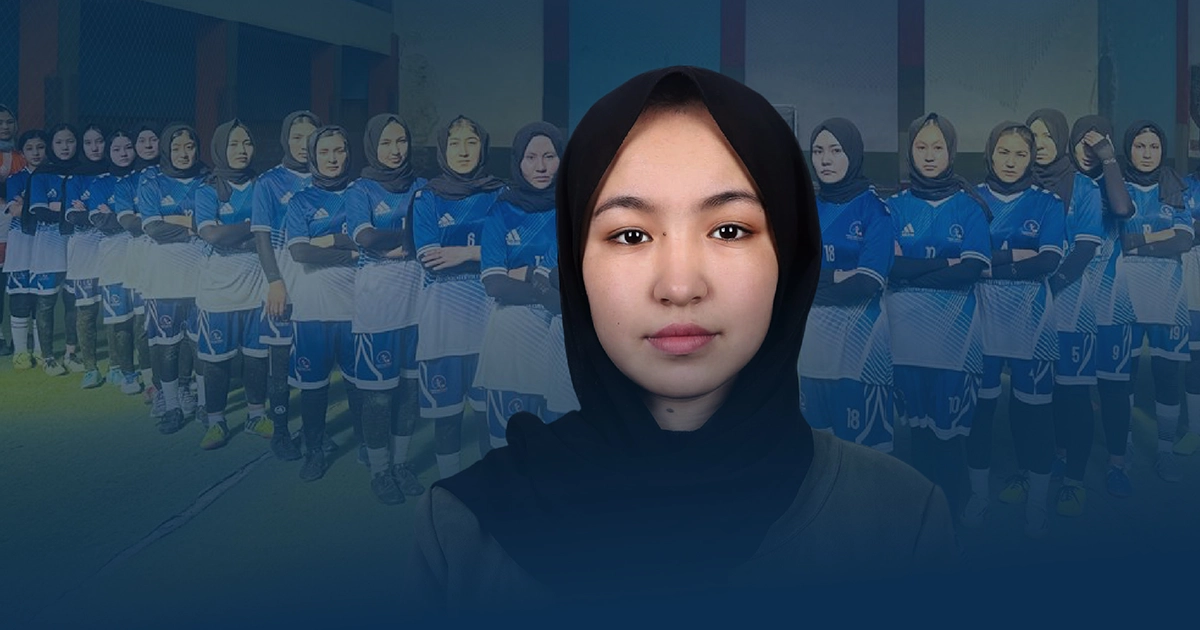
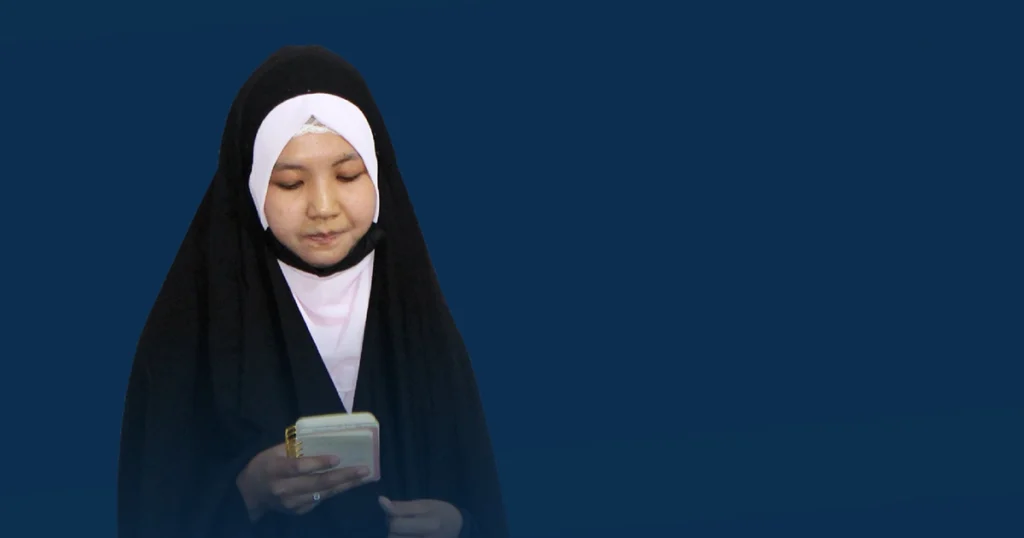
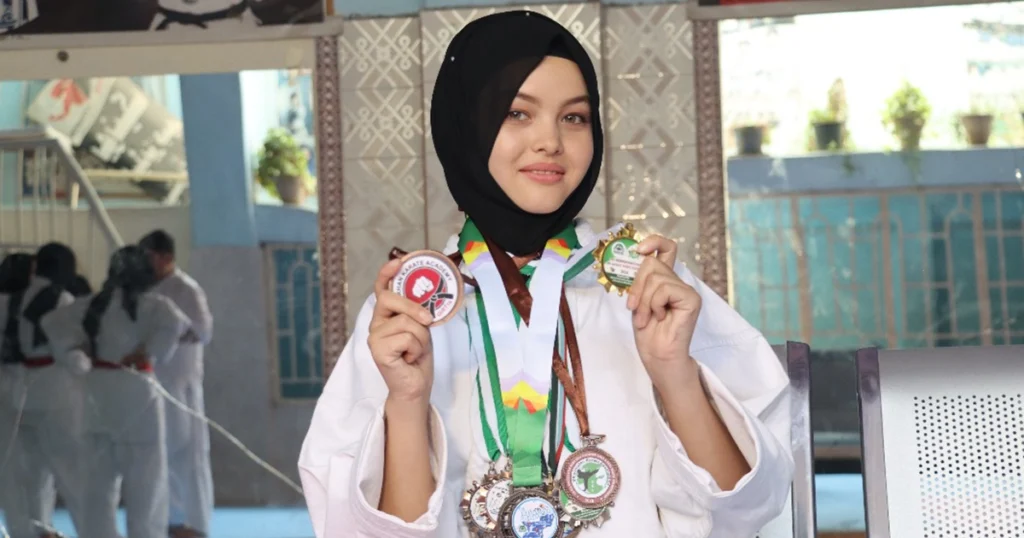
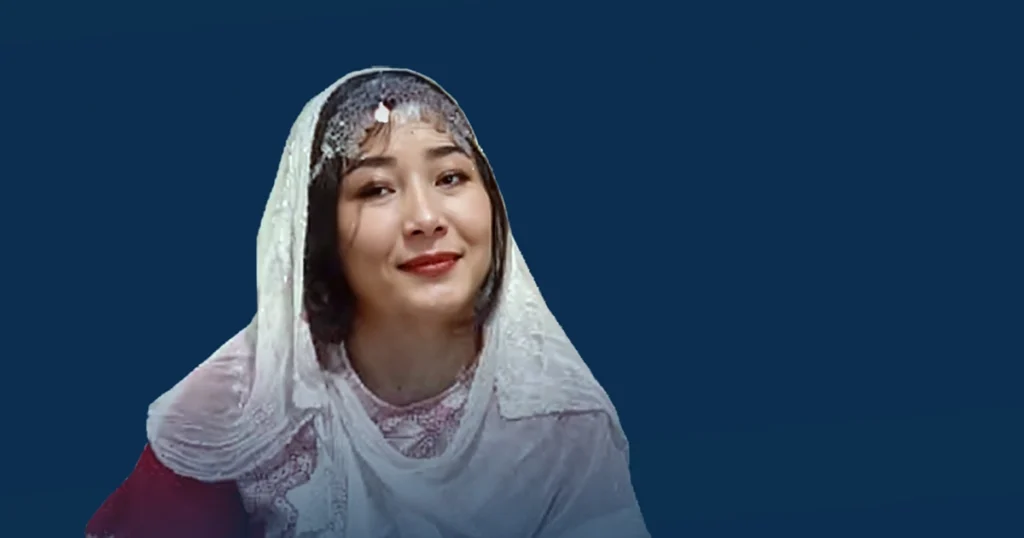
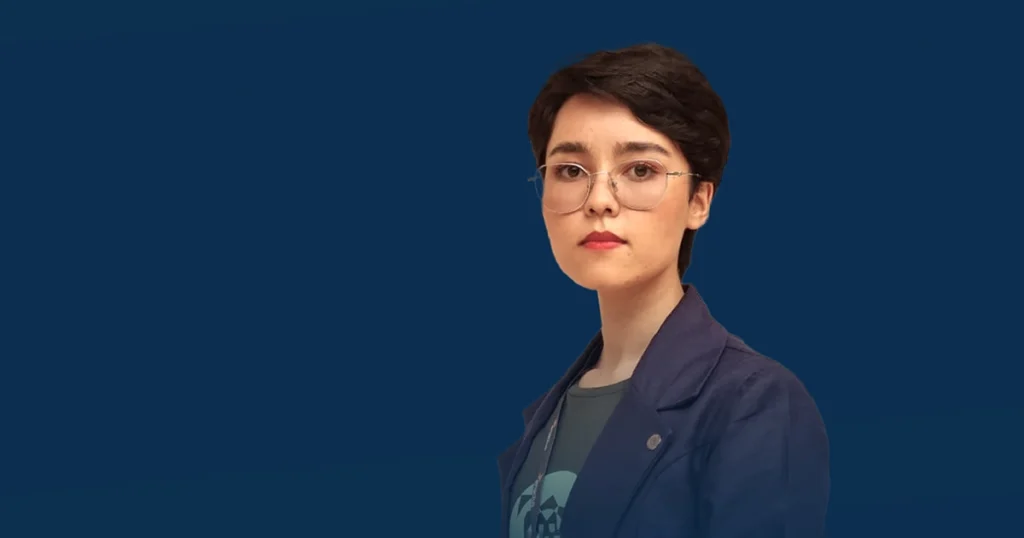
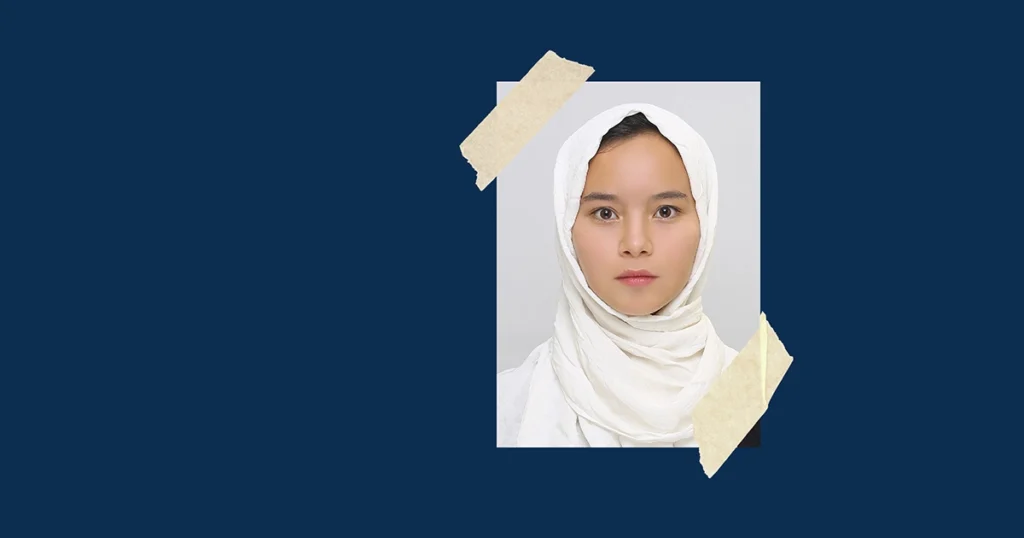
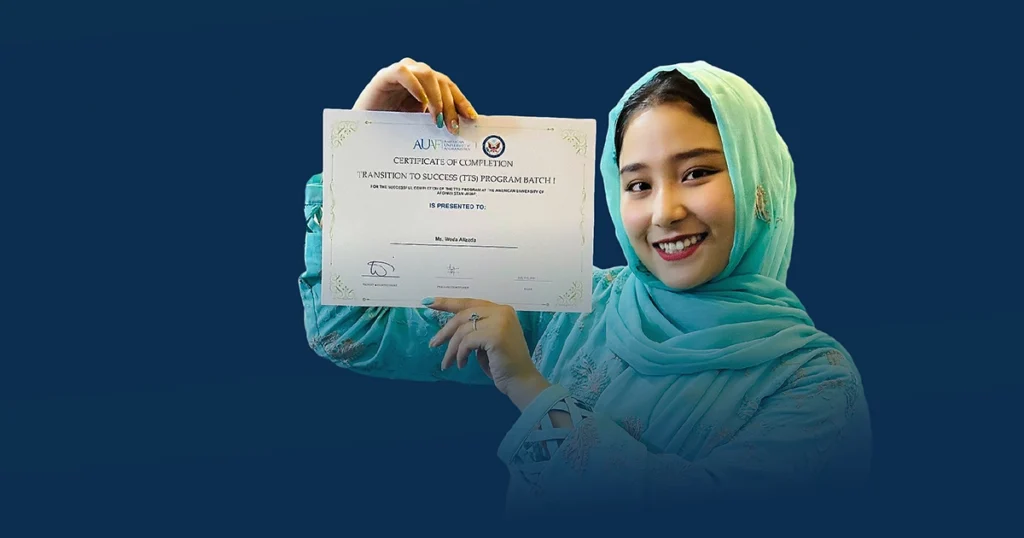
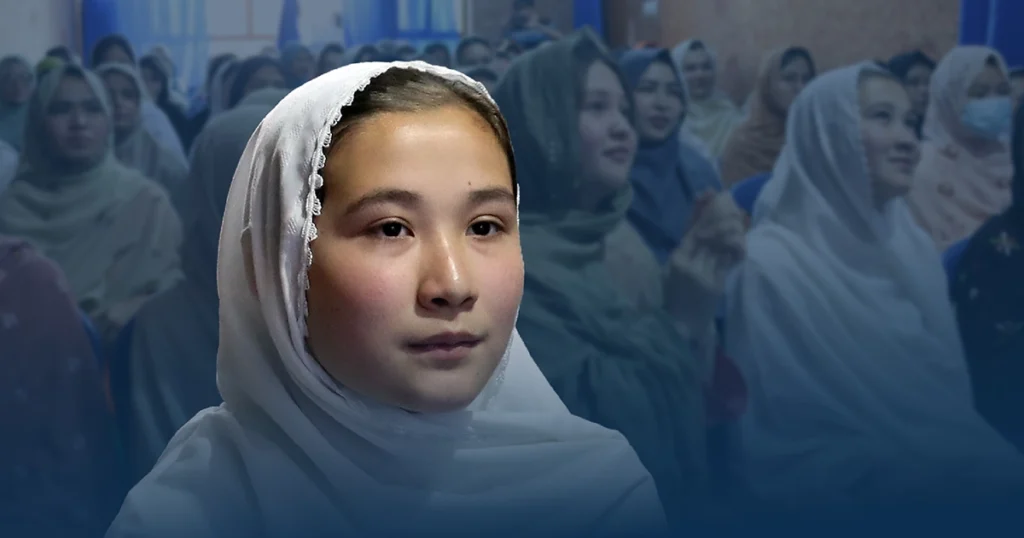
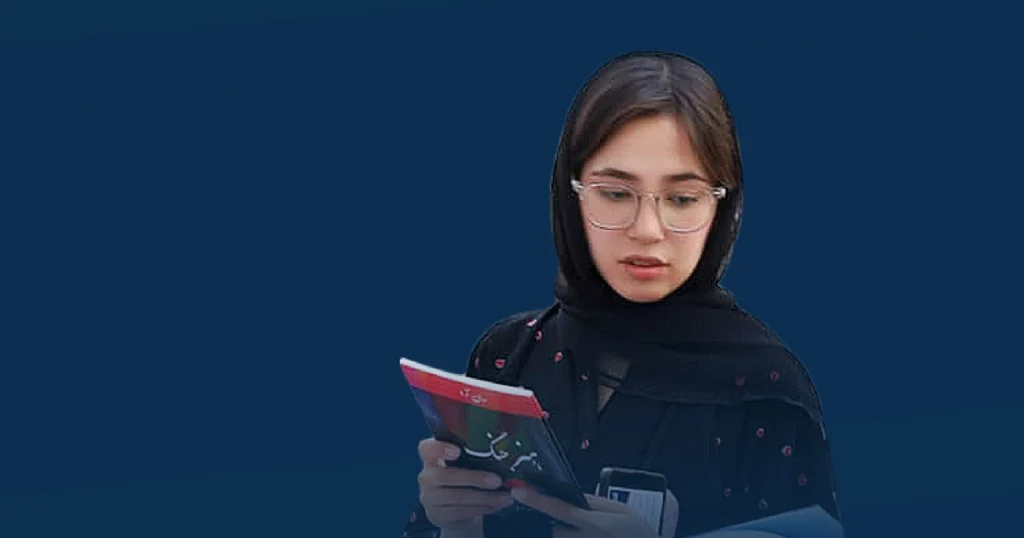
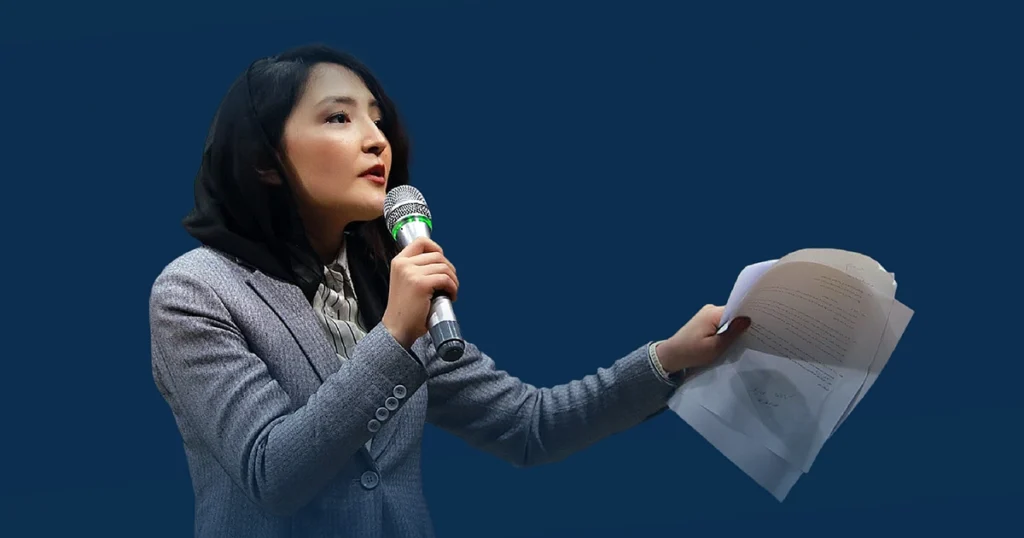
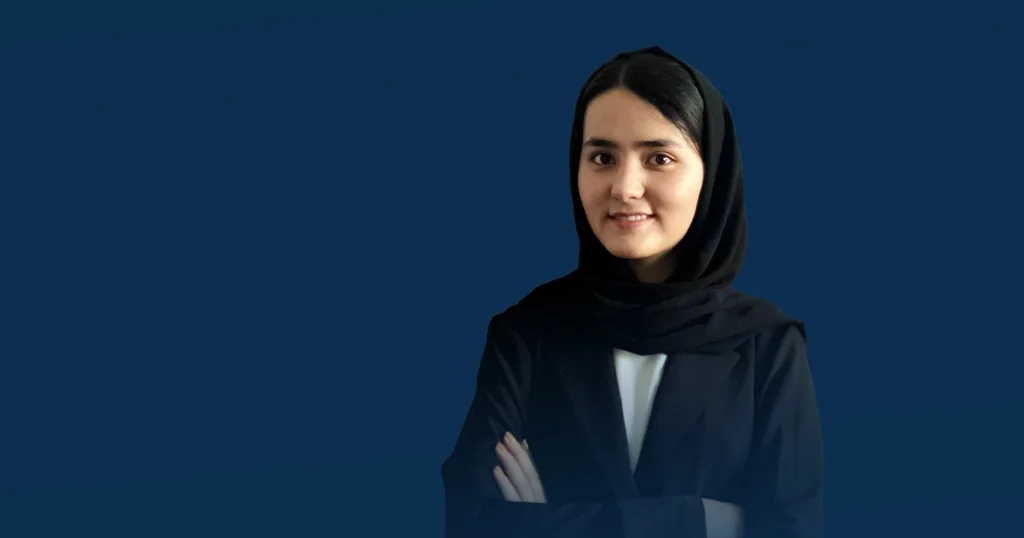
Comments (0)
Leave a Comment